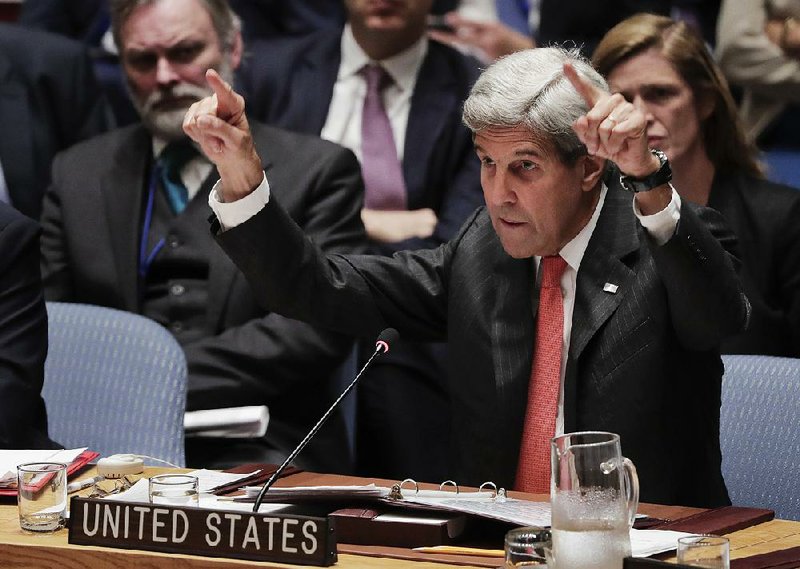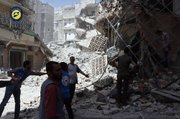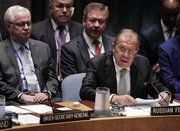UNITED NATIONS -- John Kerry called out Russia for its support of Syria's regime during the collapse of a cease-fire, accusing Russia of enabling President Bashar Assad to violate the truce intended to let in humanitarian relief and lead to negotiations in the civil war.
Wagging his finger at Foreign Minister Sergey Lavrov across the horseshoe-shaped table at the U.N. Security Council, the U.S. secretary of state on Wednesday urged Russia to ensure Syria's compliance with the cease-fire, which the two hammered out in Geneva two weeks ago.
Kerry demanded that planes immediately avoid areas where humanitarian aid would be delivered as a way "to restore credibility to the process."
"How can people go sit at a table with a regime that bombs hospitals and drops chlorine gas again and again and again and again and again and again and acts with impunity?" Kerry told the Security Council meeting, setting aside his prepared remarks. "Are we supposed to sit there and have happy talk in Geneva when you've signed up to a cease-fire and you don't adhere to it? What kind of credibility do you have?"
Kerry's remarks highlight a growing U.S. frustration with Russian leaders who have insisted they want the cease-fire to work yet haven't ensured Assad's compliance with it. But Russia is similarly distrustful of the U.S., saying it's protecting Islamic extremist groups allied with moderate opposition forces in the country. Suspicions between the two sides only grew after U.S.-led coalition jets killed more than 60 Syrian soldiers in a strike over the weekend that the Pentagon called an accident and after the U.S. said Russia was ultimately to blame for an attack Monday on an aid convoy that killed 20 civilians.
Russia has denied U.S. claims that it was responsible, but Kerry focused on its shifting explanation of what might have happened.
First, Kerry said, Russian President Vladimir Putin's spokesman described the attack as a "necessary response" to an alleged offensive by al-Qaida-linked militants elsewhere in the country. Then a Russian ambassador said forces were targeting another area.
Russia's Defense Ministry followed by saying the aid convoy was accompanied by militants in a pickup with a mortar, Kerry said, adding that no such evidence exists. Then the ministry denied any Russian or Syrian involvement as its spokesman suggested, in Kerry's words, that "the food and the medicine just spontaneously combusted."
"This is not a joke," Kerry exclaimed, urging all to stop the "word games that duck responsibility or avoid the choices ... with respect to war and peace, life and death." His pleas crossed paths with another statement by Russia's government, this time suggesting a U.S. coalition Predator drone was operating nearby when the convoy attack occurred. The Pentagon said no drone was in the area at the time.
Kerry called for all warplanes to halt flights over aid routes, and Russia's chief diplomat spoke of a possible three-day pause in fighting.
"Supposedly we all want the same goal. I've heard that again and again," Kerry told the council. "Everybody sits there and says we want a united Syria, secular, respecting the rights of all people, in which the people of Syria can choose their leadership. But we are proving woefully inadequate in our ability to be able to get to the table and have that conversation and make it happen."
'Political engineering'
Kerry's words came immediately after Lavrov's more muted ones in his speech before the Security Council, but Lavrov nonetheless directed his own share of criticism at the U.S., faulting it for not ensuring opposition compliance with the cease-fire and saying it did no good to cast blame for the aid convoy attack without a "thorough and impartial" investigation.
"Russia has always been in favor of a purely peaceful solution to this crisis," Lavrov said.
Lavrov, whose country has helped the Syrian government shore up its position, said the U.S. bore the biggest responsibility for peace in the task of separating opposition forces from terrorists. He called for the U.N. to expand its terrorism list to include groups at the fringes of a U.S.-backed rebel umbrella group and called Washington's errant strike on Syrian troops an "outrageous violation."
The Russian also cited a series of truce violations by U.S.-backed rebel groups near the northern city of Aleppo. He also called Syria's conflict as well as those in Iraq and Libya the "direct consequence" of foreign military interventions and "political engineering."
Lavrov mentioned the possibility of a three-day period of "silence" in the fighting.
In opening the session, U.N. Secretary-General Ban Ki-moon said, "We are at a make-or-break moment."
His peace envoy to Syria, Staffan de Mistura, described his long-delayed plans for a multistep Syrian peace process and transition that appeared, even by his own admission, untethered to reality on the ground.
"I know, it looks like a dream," de Mistura said.
In its current form, the U.S.-Russia deal was supposed to bring seven days of quiet and allow humanitarian aid to be delivered to trapped civilians. Russia and the U.S. would then share intelligence to coordinate airstrikes against Islamic State and Jabhat Fatah al-Sham, the group formerly known as the Nusra Front.
That plan, which the Pentagon has been wary of, exposes a fundamental flaw of the deal: U.S. promises of cooperation with Russia have raised suspicion among the opposition, which sees Washington as no longer acting in its interests.
Throughout the cease-fire negotiations, Kerry acknowledged that the deal was imperfect but said his motivation for continuing is that the alternatives are worse. He insisted even Wednesday that the cease-fire remained the only way forward.
"When this cease-fire first began a few weeks ago, guess what -- it worked," Kerry said at the Security Council. "The United States continues to believe there is a way forward. Our shared task here is to find a way to use the tools of diplomacy to make that happen."
Aid convoys to resume
In Syria, an airstrike killed four medics responding to an earlier bombing raid, a relief group said Wednesday, as the U.N. announced it would resume aid deliveries suspended after Monday's attack on the aid convoy.
The U.N said convoys to priority areas would be resumed, with deliveries planned as early as today. "Our obligation to civilians on all sides is to go where and when we can with relief," said Jan Egeland, a senior U.N. humanitarian official focused on Syria. "We hope to resume convoys tomorrow and Friday, but still work on security guarantees.
But air raids continued in other parts of Syria, with activists reporting at least 23 civilians killed in the besieged parts of Aleppo city and the nearby rebel-held Idlib province.
The attack that killed the medics took place shortly after they arrived at the scene of an airstrike Tuesday in the rebel-held town of Khan Touman. As the medics deployed, planes circled around and struck the area again, Dr. Oubaida Al Moufti, vice president of the International Union of Medical Care and Relief Organizations, said. Al-Moufti initially said five medics were killed. The group later said two nurses and two ambulance drivers were killed, while a third nurse remains in critical condition.
Syrian government forces have been accused of carrying out "double tap" attacks throughout the 5½-year war, placing paramedics and rescue workers in peril.
The Britain-based Syrian Observatory for Human Rights said nine militants, some of them belonging to Jabhat Fatah al-Sham also were killed in the "double tap" attack.
It was not immediately clear who carried out the strike. Aircraft from Syria, Russia and the U.S.-led coalition are targeting Jabhat Fatah al-Sham, which along with the Islamic State extremist group was excluded from the cease-fire.
The airstrike on a Syrian Arab Red Crescent convoy Monday night prompted international condemnation over attacks targeting humanitarian facilities and workers. U.N. chief Ban described the convoy strike as a "sickening, savage and apparently deliberate attack."
In New York on Tuesday, Russian and U.S. diplomats insisted that the cease-fire, which went into effect nine days ago, was not dead. The Syrian military said the truce expired Monday night, shortly before presumed Russian or Syrian government jets launched a sustained aerial attack on Aleppo's opposition-held neighborhoods.
The cease-fire was intended in part to allow humanitarian convoys to reach besieged and hard-to-reach areas throughout Syria. The U.N. estimates that some 6 million Syrians live in such areas.
The Observatory, which relies on a network of activists inside Syria, said at least 11 civilians, including three children and three women, were killed Wednesday during air raids on several rebel-held neighborhoods of Aleppo.
Ibrahim Alhaj, a member of the volunteer first responders known as the Syria Civil Defense, said 24 people were killed in the Aleppo strikes.
In nearby Idlib, the Observatory said 12 civilians, including two children, were killed in at least eight air raids.
Elsewhere in Syria, airstrikes on the opposition-run town of Talbiseh, outside the central city of Homs, killed two civilians and wounded tens of others, according to the activist-run Talbiseh Media Center.
The town is besieged by government forces. The Observatory said government jets subjected the town to heavy bombardment Wednesday morning.
State TV meanwhile said a Syrian warplane crashed after carrying out a combat mission against Islamic State militants northwest of the capital, Damascus. The pilot was rescued, according to an unnamed military official quoted on state TV.
The Islamic State-affiliated news agency Aamaq said the group downed the plane in the eastern Qalamoun mountains after the aircraft carried out four raids. The Islamic State shot down a government aircraft Sunday in the eastern Deir el-Zour province.
Information for this article was contributed by Nick Wadhams of Bloomberg News and by Philip Issa, Jamey Keaten, Lolita C. Baldor, Jeffrey Schaeffer, Sarah El Deeb and Albert Aji, Bradley Klapper, Edith Lederer and Maria Danilova of The Associated Press.
A Section on 09/22/2016



